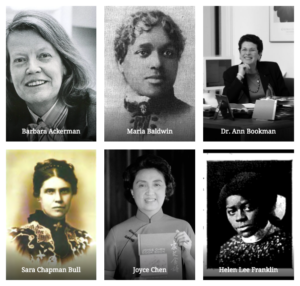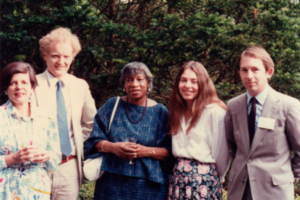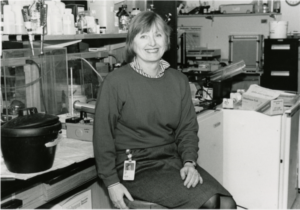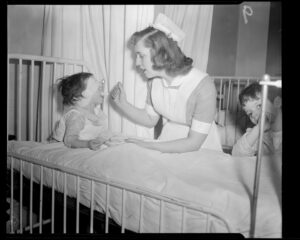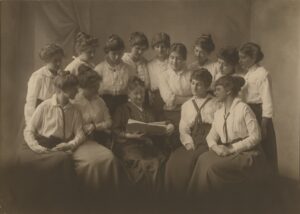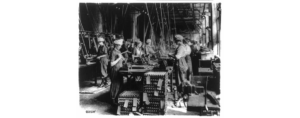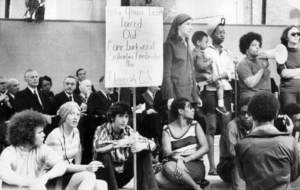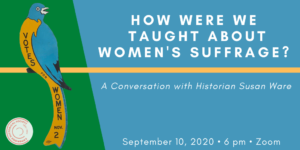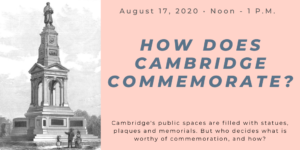Posts Tagged ‘2020 Who Are Cambridge Women’
Women’s History Hub
Profiles included: Barbara Ackermann | Maria Baldwin | Ann Bookman | Sara Chapman Bull | Joyce Chen | Helen Lee Franklin | Suzanne R. Green | Lois Lilley Howe | Edith Lesley | Eva Neer | Mercy Scollay | Elizabeth Sullivan | Phyllis Wallace Our 2020 theme was Who Are Cambridge Women? But why spend…
Read MorePhyllis Ann Wallace, A Leader for Equal Opportunity
By Annette LaMond* | S.M., MIT Sloan School of Management | Ph.D., Yale University In 1975, Phyllis Wallace,1 then age 54, became the first Black woman – and first woman – to receive tenure at MIT’s Sloan School of Management. When Phyllis arrived at MIT in 1972, she rented an apartment in a tall-for-Cambridge building…
Read MoreEva Neer : My Neighbor, Groundbreaking Biochemist
By Annette LaMond* | S.M., MIT Sloan School of Management | Ph.D., Yale University In 1978, my husband and I moved to Brewster Village – an 1880s “development” of Queen Anne Victorians off Brattle Street. We soon began to meet our new neighbors. In our first six months, we were invited to not one, but…
Read MoreWho Is Essential Cambridge? Part 4: COVID-19
In our last installment, we examined the role of nurses as essential workers in Cambridge and beyond, exploring the ways in which gendered notions of caregiving and self-sacrifice both elevated nurses in the public opinion and limited their ability to advocate for better pay and working conditions. In this, our final installment, we look at…
Read MoreWho Is Essential Cambridge? Part 3: Nurses
In our last installment, we examined the role of Cambridge teachers as essential workers during the twentieth century. As it involved nurturing young children, teaching was viewed by many as a natural outgrowth of women’s caregiving responsibilities within the family, and education, especially at the elementary level, was considered a profession to which women devoted…
Read MoreWho Is Essential Cambridge? Part 2: Teachers
In the first part of our series, “Who Is Essential Cambridge?,” we examined the role of Cambridge women in the industrial sector during and between the World Wars. Women played an important role in industrial production in the years before the outbreak of World War I—a role that continued and intensified over the coming decades.…
Read MoreWho Is Essential Cambridge? Part 1: War and Industry
What was the role of Cambridge women in industrial production?
Read MoreSelf-Guided Tour: Women Activists of Riverside 50 Years After Suffrage
Stop 1: Begin the tour in Central Square With the passage of the 19th Amendment one hundred years ago this past August (2020), American women won the right to vote. Rather than a culmination, this event marked the beginning of a long fight for equal treatment and equity that is still far from over. Fifty…
Read MoreHow Were We Taught About Women’s Suffrage? A Conversation with Historian Susan Ware
During this important centennial year we have had many opportunities to learn about the decades-long movement for women’s suffrage that culminated in the passage of the 19th Amendment in 1920. But how has our understanding of this complex and multilayered history been shaped by what we were taught in school? When, and in what ways,…
Read MoreEvent Recap: How Does Cambridge Commemorate?
On Monday, August 17, CHS held a Virtual History Café exploring monuments and memorials in Cambridge. In this program, “How Does Cambridge Commemorate?” we examined several of the city’s most prominent public monuments, and we were joined by Kim and Sofia Bernstein, honorary members of the Cambridge Nineteenth Amendment Centennial Committee who provided the impetus…
Read More
